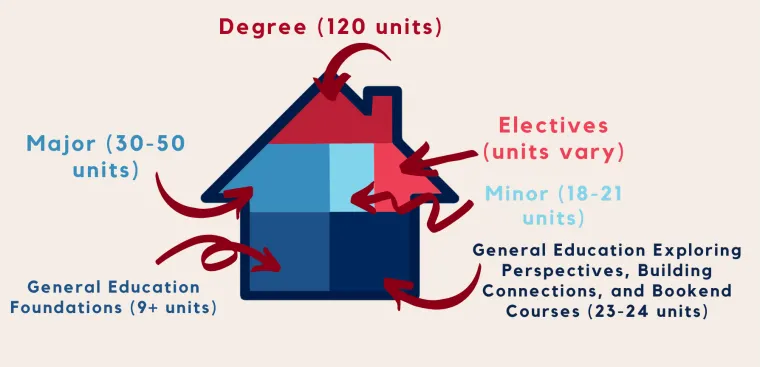Prospective Students
It's never too early to start exploring.

Welcome, prospective students, to our major exploration resources!
Advisors at The A Center are willing to work with you before you even start your academic journey at The University of Arizona. Learn more about scheduling an appointment.
On this page, we will review more information about what a college major is and help you understand why many students are undecided about their major, along with what it means to start as Undeclared in The A Center.
Understanding the College Major
A college major is just one component of a college degree. Below, we have created a representation of the components of a U of A degree, which is made of foundations, general education, major, minor, and elective courses. Everyone’s house will be different, too. You might decide to double major, add a couple of minors, or even have two separate degrees!
When entering college as an Undeclared student, General Education courses can be great for major exploration. Find a General Education course offered through a major you're considering. If you love the subject matter, you've made a huge step in finding the right major for you. If the disciplinary perspective is not one you want to pursue, no worries: you've still earned General Education credit needed to graduate. It's a no-risk way to explore your options.

Please review some of the common thoughts or concerns about majors listed below:
In The A Center, we serve thousands (yes, thousands!) of freshmen and sophomores every year. Why? Because choosing a major requires research and reflection. Explore yourself and your options so you can make the most informed decision.
You can major in anything and go on to medical school or law school so long as you complete the prerequisite courses. In 2017, the most accepted major to medical school was English! Law schools have fewer requirements, and want you to choose an academic path that suits your interests. They will teach you how to understand and argue the law when you get there. Professional schools are interested in the skills you acquired from your major, not the label it carries.
It is true that some occupations require that you pick a specific major: Want to be an accountant? Yes, study Accounting. Most of the time, however, the relationship between majors and careers is much more dynamic. Most majors relate to jobs only as much as you want them to. For example, a student pursuing a Psychology major may choose to enter a psychology-related field, such as counseling, but they could also choose careers in event planning, entertainment, non-profit work, or advertising, for example. Here's the thing about college: It is not a vocational school, teaching you how to do any one specific task. College is about becoming educated, learning about the complexity of the world around you, learning to communicate ideas, and taking part in research and discovery. These skills are what employers looks for in their employees.
Most students take the same types of classes during their first two years of college: General Education courses. These courses are required of all students regardless of major. If you're worried about being behind in your first two years, meet with your academic advisor to get a sense of what is expected of you during those first four semesters. If you have a specific area of interest in mind, we will assist you in selecting classes toward that interest.
You are the one earning the degree- your values, your academic strengths, and your interests are key. You may seek input from your support network, but the decision is ultimately YOURS. When you research major and career options, you will feel more confident explaining to your family why your picks are the best choices for you!
Instead of thinking about what major is the best for you, think about making an informed decision. There is no perfect fit. There may be classes in which you struggle or classes you don't like that are required for your major, but that's okay. What matters is that you enjoy the majority of your coursework.
Yes, it is required that you declare a major before you transfer to the University of Arizona; however, The A Center is here to help regardless of where you are in the process. We recommend reaching out to us before you transfer to discuss major exploration, but you are also welcome to meet if you need to discuss options after you transfer, too.
Starting Undeclared
Unsure about your major and not sure where to start? You are in good company!
Each semester, the University has hundreds of Undeclared students, which actually makes this one of the most popular choices on campus. Even though it may seem that many students have their major figured out, there is a benefit to being Undeclared and exploring your options before choosing a major. You will receive excellent academic advising in The A Center. The advisors will help you explore areas of interest, discover a major you may never knew existed, and start the process of choosing the right major for you, one that aligns with your academic goals. With more than 270 majors on campus, there’s something for everyone.
If you are a transfer student looking to start Undeclared, please reach out to our office to discuss major exploration options. Since you are not able to select Undeclared on transfer applications, we are willing to help you in the process of selecting a major as you transfer to the university.
If you begin your first year as an Undeclared student, The A Center advisors will help you move step-by-step through a first year advising program to help you down the pathway to declaring a major. Some of the highlights include:
We recommend having at least two advising appointments per semester with your advisor. If you are in your first semester at the university, we even recommend three! In addition, if you are a pre-health or pre-law student, we recommend meeting with those advisors at least once a semester.
Throughout the first-year we provide programming to assist in the major exploration process, including registration workshops, Meet Your Major Fair, and Major Declaration Day. Our events are designed with your major exploration journey in mind!
In the spring semester, first-year students in The A Center are encouraged to participate in a Major Exploration Program. This could include taking our major exploration course, SERP 197P, visiting the Life Lab on campus, participating in a job shadow, or taking an introductory major course. Our advisors will assist you in the fall semester to pick a program that works best for you—or even create your own program!

